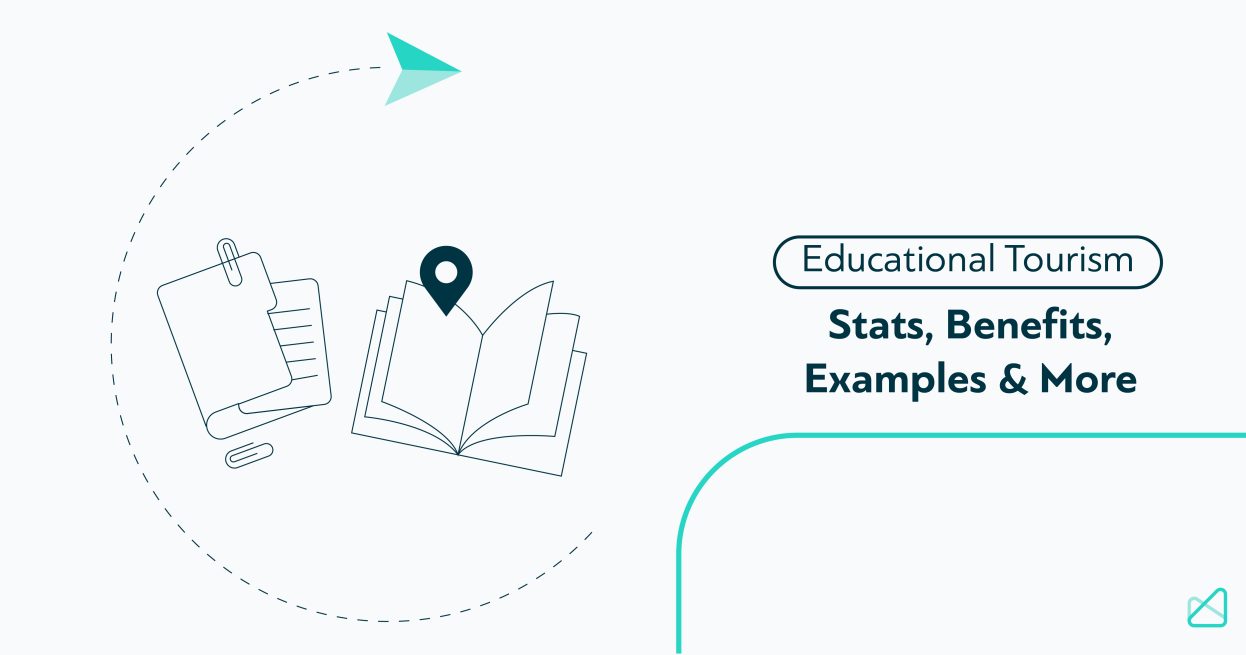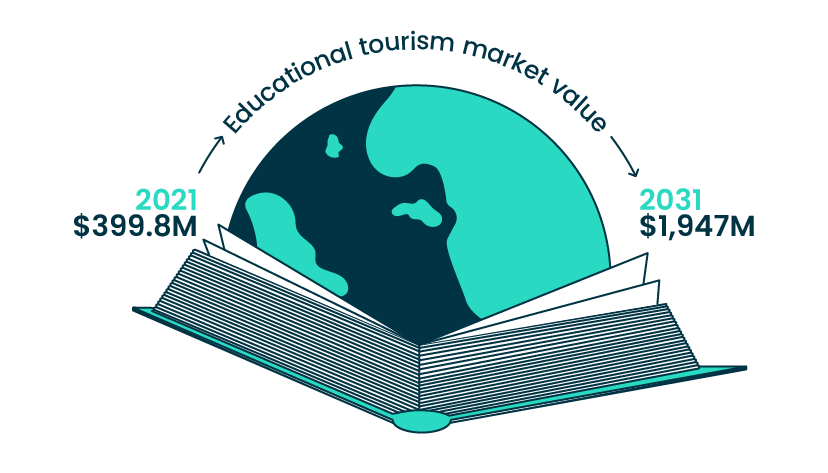What is Educational Tourism: Stats, Benefits, Examples & More

The global tourism industry is very diverse. With the number of different types of tourism and the number of ways travelers interact with tour packages increasing, it can be pretty hard to keep track of each travel sector’s subdomain.
On the other hand, getting insights from a particular travel sector subdomain can help you make informed decisions, such as whether or not to add new travel products to your offer.
One of the tourism forms that became very popular recently is educational tourism. While it’s not a brand-new tourism concept, educational tourism accumulated enormous interest. To help you understand what it is, we’ve decided to put together an educational tourism ultimate guide that covers everything from its definition to real-life examples.
What is educational tourism?
Educational tourism or edu tourism is a form of tourism. As we mentioned earlier, it’s not a brand-new concept in this vertical – it can be traced back to the 17th century. History records the success of the “Grand Tour,” which marks the beginning of educational tourism as we know it. When it began, it was mainly popular among the aristocratic British youth. It was essential to their education through the 17th, 18th, and 19th centuries.
After the UK, other European countries followed, and many scholars traveled to the old continent in search of new knowledge or to learn from their peers and study languages.
It goes beyond the other forms of tourism that mainly offer business or pleasure travel packages. This new trend in the global tourism industry has one purpose – to create opportunities for travelers to obtain new experiences and knowledge on a wide range of topics.
Every travel product that enables travelers to learn about foreign cultures, study new things, engage in study tours, or apply a learned skill is considered an educational tourism’s product. Large-scale mass tourism is still popular, but some travelers seek other options that enable them to travel and yet be able to acquire new knowledge. The shift in travel demands is one of the main factors driving the growth of this sector.
Now, that you understand what educational tourism is, let’s see the current state of the educational tourism market, including recent trends and projections.
Stats
Most sectors declined during the past few years, and the educational tourism industry was no exception. The tourism sector has experienced a decline because many countries imposed international travel restrictions. Compared to previous years, foreign tourism decreased by 22% in the first quarter of 2020 and 65% in the first two quarters of 2020.
However, the sector quickly came back on its feet the moment governments around the globe lifted the travel restrictions. The latest research findings support our previous claim that educational tourism is increasing in popularity.
The global educational tourism market value in 2021 is estimated at $399.8. It means that the market exhibited a year-on-year growth of 16%. The same research projects that the market will continue to grow with a compound annual growth rate of 17.2%. By 2031 its value is projected to reach $1,947 billion.

According to Future Market Insights, the total number of global educational tourists in 2022 was over 6 million. They’ve identified four main contributing factors to the market growth and increasing popularity of this sector:
- Access to new information;
- Emerging education styles;
- New research techniques;
- Enormous exposure to science.
Furthermore, the FMI report indicates that most inbound educational tourists are interested in obtaining a master’s degree, making students one of the most significant demographic segments driving the sector’s growth. More precisely, the age group of 19–25 years generates a whopping 73% of global educational tourism market revenue. The students alone generate 39% of the overall sector’s revenue.
Benefits of educational tourism
Educational tourism offers many benefits for all parties involved, including travelers, the host community, and the host nation. It has the power to drive the growth of many sectors and help develop entire regions and communities. With this in mind, let’s see the more specific benefits this type of tourism brings.
Monetization of previously unexplored places
Educational tourism travel can help a region leverage unexplored places and make them available for tours, trips, and excursions. Monetizing these locations can help bring more money to the region and enable it to thrive, make necessary improvements, and attract more travelers in the future.
Improved international collaboration
Governments can recognize the value of educational tourism, especially if they identify travel patterns that indicate their educational tourism offer attracts travelers from a specific country. Governments can improve international collaboration, opening room for more exchange programs, workshop travels, and international scientific research.
Improved image of a city, nation, and country
Educational tourism has the power to improve the image of a city or an entire nation or country. Offering a memorable and pleasant experience to foreign travelers can help a country build a positive image. It can help other tourism sectors attract more visitors and secure stable revenue streams.
Increased number of employment opportunities
The only way to deal with the increasing educational tourism demand in a specific location is to hire more professionals. It’s a great opportunity for countries to lower unemployment rates and offer new employment opportunities in the travel sector to local communities.
New entrepreneurship opportunities
Tourism is one of those industries that can facilitate the growth of other verticals, such as entertainment and hospitality. With the stable influx of educational tourists, there will be plenty of new entrepreneurship opportunities people can pursue to launch successful businesses.
The rapid development of infrastructure
Educational tourism can create the need for new infrastructure in some areas. With the revenue it helps create, local governments can develop new infrastructure plans and have sufficient budgets to build infrastructure to both the local community’s and travelers’ delight.
Lots of benefits for the travelers
Travelers engaging in educational tourism activities stand to gain much more than just exploring new destinations. Educational tourism can help them change their perspective or worldview, increase independence and self-confidence, enhance cultural awareness and dispel stereotypes, and facilitate intellectual and cognitive growth.
Types of educational tourism
Education tourism is a big branch of tourism. Over the years, the market demand has enabled educational travel organizations to develop various educational packages and trips. Some of these packages have many things in common, allowing us to outline several major types of educational tourism.
Language schools
There is no better way to learn a foreign language than to do it by immersing yourself in it. And the best way to do it is to travel to the country where it is spoken. Language schools for foreign languages attract language learners from all over the world.
Learning the native language inside the classroom and then interacting with it outdoors while exploring the cities and country is something language students find attractive. As the final result, we have language schools as one of the major types of educational tourism.
Youth traveling
Youth traveling is the next major type of this tourism branch, involving a wide range of activities mainly developed for children and adolescents. Some youth traveling products include school excursions, youth exchanges, and other programs stimulating creativity and development.
A unique combination of learning and travel experiences engages kids and adolescents and invites them to obtain new skills and knowledge while learning about other cultures and exploring iconic sights worldwide.
Workshop travels
Workshop travels include group and individual travels that share one common goal – acquire knowledge from renowned experts while traveling abroad. Workshop travels’ final destinations are often workshops, seminars, and symposiums.
This type of educational tourism is popular among people of any age, which makes it a pretty prominent kind of tourism. Besides individuals, organizations are also common buyers of workshop travel products. It enables businesses to diversify their professional growth and development programs and keep employees engaged.
Student exchange programs
Student exchange programs were always popular. However, student exchange programs became quite popular after introducing systems that enable students to earn credits towards their degree despite where they attend courses, such as the European Credit Transfer System (ECTS).
These programs enable students to work with some of the best professors worldwide and experience their teaching methodologies firsthand. However, these programs don’t exclusively offer students access to courses. They can encompass various camps, internships, and sports competitions as well.
International scientific research programs
Masters and Ph.D. students must research a chosen topic to get a degree. Many choose to do it abroad, working with renowned professors and researchers.
Given the popularity of this type of travel, international scientific research programs make a unique type of educational tourism.
Tourism education
Students seeking knowledge in developing tourism sectors abroad must travel and spend time in a country. The hands-on experience and unique insights complete the tourism education and add additional value to students and operators in a location.
Tourism education helps create more sustainable tourism and encourages young entrepreneurs to start their own tourism businesses.
Who is it for?
Educational tourism is not exclusively reserved for any specific demographic group or country. There are examples of very young kids engaging in educational tourism activities. While it is the most popular form of travel among students, older generations benefit from it by visiting seminars and symposiums in foreign countries.
This type of tourism is an excellent opportunity for travel businesses, transportation, and accommodation providers. They can work hand-in-hand with local educational institutions and governments to create attractive programs and enhance the travel experience to invite more people to come and spend their time in a location.
Real-life examples
Many organizations exclusively specialize in educational tourism. Let’s take a closer look at some examples to better understand this unique tourism model.
GVI Company
GVI Company specializes in connecting like-minded people to enable them to collaborate on social development programs. They have tailor-made programs for people interested in internships, volunteering, and studying. The company is based in several communities worldwide and works with partners in those communities to deliver the best possible experience to young travelers.
EF Tours
EF Tours has been a go-to company for teachers and parents around the globe for quite a few years now. The company specializes in bringing different student tours at very attractive prices. However, the attractive prices are not the only thing that makes EF Tours so popular.
The company regularly includes new programs to ensure there is an excellent opportunity for all students who go beyond the classroom to pursue new knowledge, no matter how specific their interests might be.
Meridian Overseas
Meridian Overseas is the leader in connecting students eager to study and travel to educational tourism consultants. They help students find the best programs for their needs in the UK, USA, Italy, Canada, New Zealand, Australia, and Germany. The company went even further, enabling students to take IELTS coaching classes to excel in programs where English is their native language.
Global Volunteers
Global Volunteers, as the name suggests, brings numerous volunteer opportunities in the USA and abroad to people who want to be part of the change. The company has a vast network of professionals and partners. Thanks to its extensive networks, the company enables travelers from all possible walks of life to volunteer in various organizations, from classrooms and clinics to childcare centers and farm fields.
ACIS Educational Tours
ACIS stands for the American Council for International Studies. The organization was established back in 1978. Several decades of extensive experience and an extensive network of partners enable ACIS to deliver excellent educational trips to middle and high school students.
The company has branches throughout the US, including those in London and Paris. They offer many unique educational travel products, such as culturally immersive tours, private tours, youth, young women’s leadership tours, STEM-focused tours, and many others.
Conclusion
Educational tourism is one of the rapidly growing tourism industry branches. It offers a unique value – a perfect mix of adventure and learning. There are many types of educational tourism, each one offering specific advantages. Given the range of benefits, it offers to travelers, travel and educational institutions, communities, and countries – it’s safe to assume that this sector has a bright future ahead of it, as is reflected in the projected global educational tourism market growth.
Subscribe to
our newsletter
Yay! You are now
subscribed to our
newsletter
Mize is the leading hotel booking optimization solution in the world. With over 170 partners using our fintech products, Mize creates new extra profit for the hotel booking industry using its fully automated proprietary technology and has generated hundreds of millions of dollars in revenue across its suite of products for its partners. Mize was founded in 2016 with its headquarters in Tel Aviv and offices worldwide.
Related Posts

Empowering Equality: Mize Leads the Way in Travel Technology
7 min. Are we all equal? Are we all equally represented in the business world? In some professional sectors, there might still be some under-representation of women, minorities, and the LGBTQIA+ community. The tech sphere is no different, but is the travel tech sector a spark of hope? As the business world becomes more diverse, […]

Slow Tourism Case Studies: Examples to Truly Understand Slow Tourism
14 min. The tourism industry is moving at an ever-accelerating pace. That’s because the tourism industry is perhaps one of the verticals that depend on the most factors. One of the main factors that affect it is social movements, given that tourism brands of all sizes always cater to the needs of consumers. One of […]

Complete Overview of the 5 Sectors in the Tourism Industry
14 min. The tourism industry is one of the most dynamic landscapes. That’s primarily because it consists of several unique sectors. Each one of these sectors goes through comprehensive changes and is subject to many factors. Nevertheless, understanding these sectors is quite essential! Why? Because it can help you make informed business decisions, identify valuable […]